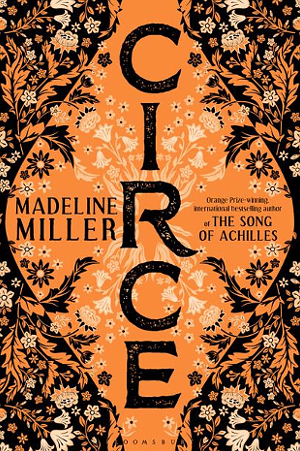

Circe: Summary on the back: In the house of Helios, god of the sun and mightiest of the Titans, a daughter is born. But Circe is a strange child - not powerful, like her father, nor viciously alluring like her mother. Turning to the world of mortals for companionship, she discovers that she does possess power - the power of witchcraft, which can transform rivals into monsters and menace the gods themselves. Threatened, Zeus banishes her to a deserted island, where she hones her occult craft, tames wild beasts and crosses paths with many of the most famous figures in all of mythology, including the Minotaur, Daedalus and his doomed son Icarus, the murderous Medea, and, of course, wily Odysseus. But there is danger, too, for a woman who stands alone, and Circe unwittingly draws the wrath of both men and gods, ultimately finding herself pitted against one of the most terrifying and vengeful of the Olympians. To protect what she loves most, Circe must summon all her strength and choose, once and for all, whether she belongs with the gods she is born from, or the mortals she has come to love.
My thoughts: Madeline Miller has an impressive talent for finding the layers of Greek mythology, drawing out emotions and depth from often over-looked figures, and adding richness to well-told stories. Circe is delightful - more mortal than god, yet unquestionably divine, no more evidenced than by the dizzying number of years the plot covers as she shifts through the various roles she plays. Unlike the shallow, evil without motivations figure of mythology, her Circe is deeply flawed yet enjoyable, both frightening, rage-filled witch and innocent nymph living in the shadow of her family, with the complexity of her personality making her an intriguing combination of protagonist and antagonist at once. She gains depth and believability in the process. Less narrowly focused than Patrocles' point of view, Circe wanders among numerous familiar characters and events - the birth of the Minotaur, the judgement of Prometheus, the fall of Icarus, the darkness brewing in Medea, Scylla's shift into monster, and, of course, Odysseus's journey home. No matter how short and unimportant their appearances or role, all of these figures are fully developed and strikingly alive, even Circe's lions! - none more so than Prometheus. He's always been my very favorite myth figure, and it was a delight to see how well the author understood him - his scene with Circe was beautiful and heartbreaking.
One of my favorite things was how, despite Circe being a very strong female character, she's not limited into the traditional "strong woman" role of most fiction - she's allowed to express emotion, have frailty, make mistakes, and, in one of the most surprisingly sweet moments of the novel, become a wonderful and devoted mother, all without compromising her strength. There's so much love in Circe, despite the lack of love in her childhood and all the people who have hurt her, and it was just so wonderful. It's a love story where romance isn't the only or most important form of love, where kindness exists even in characters never thought of for such, and its exactly what more writers could learn from.
There is a great deal of violence, some of it quite graphic, but it never felt gratuitous, simply exploring the darkness that already exists in the myths. The writing - while not dripping with the punches-to-the-heart foreshadowing of TSOA - is every bit as utterly gorgeous, combining an ancient feel with more readable, but completely lovely, prose, with lifelike settings. And the ending - I actually said "wow" out loud when I finished, such an unexpected, but completely fitting conclusion. I had absolutely no complaints with Circe, a spellbinding book that left me even more in awe of Madeline Miller's talent.
Lavinia: Summary on the back: In The Aeneid, Virgil's hero fights to claim the king's daughter, Lavinia, with whom he is destined to found an empire. Lavinia herself never speaks a word. Now, Ursula K. Le Guin gives Lavinia a voice in a novel that takes us to the half-wild world of ancient Italy, when Rome was a muddy village near seven hills. Lavinia grows up knowing nothing but peace and freedom, until suitors come. Her mother wants her to marry handsome, ambitious Turnus. But omens and prophecies spoken by the sacred springs say she must marry a foreigner, that she will be the cause of a bitter war, and that her husband will not live long. When a fleet of Trojan ships sails up the Tiber, Lavinia decides to take her destiny into her own hands. And so she tells us what Virgil did not: the story of her life, and of the love of her life.
My thoughts: The Aeneid has always been my least favorite of Virgil's works, but this book made me want to read it again and gain a deeper appreciation for it. Every line, every description was stunningly gorgeous, and the world incredibly detailed to the point I felt completely immersed in the time period and setting. There were few mythological elements other than the prophecies and a handful of nods to religious practices, making the plot very historically realistic. The tone was poignant, haunting, and strangely distant, almost as if a ghost was relating it, and from the beginning to the last page there was an aching, melancholy feel as Lavinia both embraces and fights against the inevitable fate of those she loves, as well as herself.
Above everything else, I appreciated the authenticity of the characterization. Unlike a lot of historical books where the heroine has a distinctly modern way of speaking, thinking, or behaving, Lavinia seemed utterly a woman of her time, while still retaining a distinctive voice that made her feel very real despite the ancient setting. Likewise I enjoyed that elements of the setting were never explained beyond what was necessary, just simply part of the world, allowing me to fully slip into the time period so much that it was almost jarring to come back to the real world at the end. My only complaint was the pacing - the rushed nature of certain parts of the plot, especially the three years of her marriage, the somewhat confusing jumping around of flashbacks to present in the start, and the slight dragging toward the center in the battle scenes. But for the most part it didn't affect my enjoyment of the story.
Overall Lavinia was a beautiful, rich story filled with emotion and fascinating history.
feeling:  bouncy
bouncy
jukebox: "Popsicles,Icicles"-Murmaids




